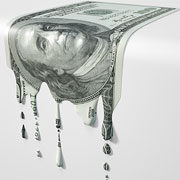Economic shifts can produce a constriction in the flow of venture capital and that is generally bad news for the technology and start-up arena. While innovation may continue, consumers may not benefit.

Venture capitalists who invest in start-up companies on behalf of themselves, wealthy individuals and institutions, can become skittish about placing faith in start-ups. Instead, they opt for their comfort zone, investing in businesses they already know or companies with proven track records. The result is a slowing in the evolution and marketing of technological advances.
Many experts, however, maintain that even when venture capital investment slows, technological advances continue through other avenues -- in people's garages, homemade labs, government research programs and university experiments. But, although the innovations are still there, they don't make it to market and the consumer as quickly as they would with the venture capital needed to capitalize:
|
|
One way to examine this issue is to look beyond sheer economic data or financial market changes. For example, you can look at the number of patent applications as correlative to the evolution of technology and its relationship to venture capital funding.
Filing statistics reveal that during one economic slowdown, patent applications didn't stop but they did lag. Some experts say that even if the economy rebounds quickly after a slowdown and venture capital immediately reaches previous levels, technology evolution continues to lag for months or even years.
So, constriction in venture capital can have far reaching and negative implications. Such delays can mean that potential advancements won't be available to those in need, causing overall quality of life to decline.
When venture capital constricts, entrepreneurs need to adapt to temporary setbacks. In such times, consult with a professional for help in raising capital and employing cost-effective and innovative solutions.



